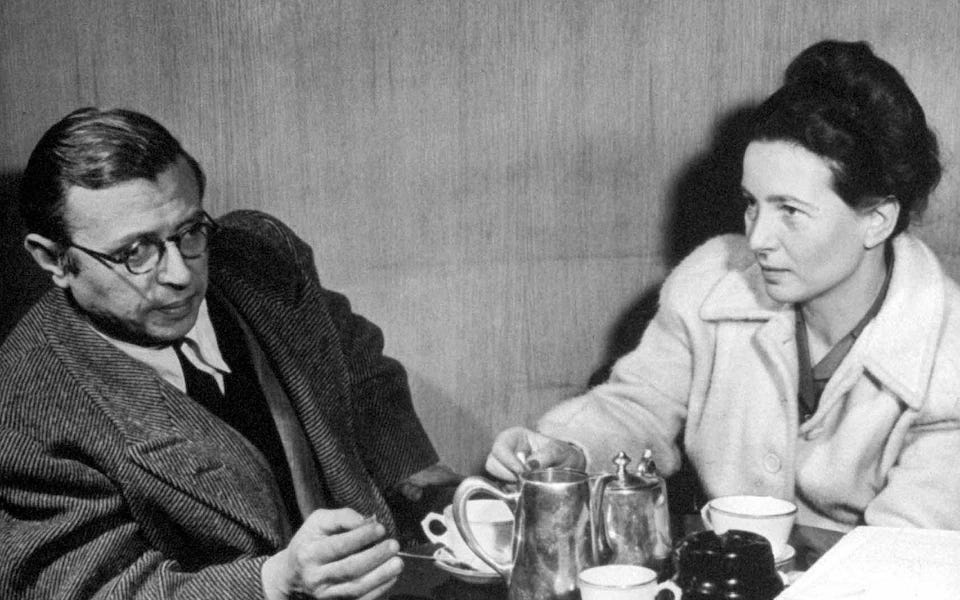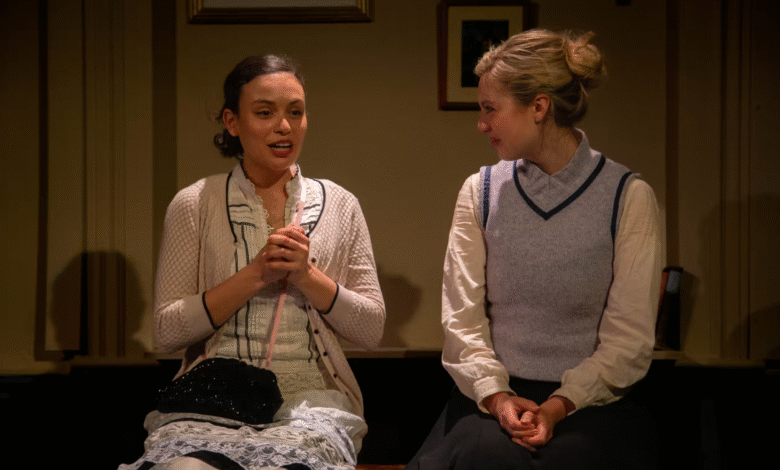The Inseparables ★★★★☆
A tender and faithful adaptation of Simone de Beauvoir’s lost novel
Perhaps because she found it too intimate – or because Sartre disapproved – Simone de Beauvoir’s 1954 novel The Inseparables wasn’t published until 30 years after her death. Grace Joy Howarth’s new stage adaptation, playing now at the Finborough Theatre in London, is a tender and faithful adaptation of this rediscovered novel.
Simone de Beauvoir was known for living unusually and for her memoirs, as much as for her writings on existentialism and feminism. While The Inseparables is a work of fiction, it is semi-autobiographical. The novel memorialises the intense friendship between Sylvie and Andrée, stand-ins for de Beauvoir and her childhood friend Zaza Lacoin respectively. We glimpse de Beauvoir’s childhood as she may have understood it: it’s a portrait of a serious-minded young girl, precocious and intellectual, unflinchingly loyal, and with a romantic streak that means she is naturally drawn to wild characters.
Famously, de Beauvoir had an unconventional open relationship with Jean-Paul Sartre, a fellow existentialist philosopher and the man she described as ‘the greatest love of [her] life’. Louis Menand put it sharply in the New Yorker, calling their dynamic ‘the traditional sexist arrangement—in which the man sleeps around and the woman nobly “accepts” the situation—on philosophical stilts’.1
The play opens like the novel: the nine-year-old Sylvie introduces herself as a ‘good little girl’ who formerly threw such violent tantrums that one of her aunts declared she was ‘possessed by a demon’. She boasts of her obedience and piety, and describes her meeting with Andrée on the first day of school (taken directly from the novel):
I went over to my stool and saw the one next to it was occupied by a hollow-cheeked little girl with brown hair, whom I didn’t recognise. She looked very young; her serious, shining eyes focused on me with intensity.
‘So you’re the best student in the class?’
‘I’m Sylvie Lepage,’ I said. ‘What’s your name?’
‘Andrée Gallard. I’m nine. If I look younger it’s because I got burned alive and didn’t grow much after that. I had to stop studying for a year but Maman wants me to catch up on what I missed. Can you lend me your notebooks from last year?’
‘Yes,’ I said. Andrée’s confidence and rapid, precise speech unnerved me. She looked me over warily.
‘That girl said you’re the best student in the class,’ she said, tilting her head a little at Lisette. ‘Is that true?’
‘I often come in first,’ I said, modest. I stared at Andrée, with her dark hair falling straight down around her face, and an ink spot on her chin. It’s not every day that you meet a little girl who’s been burned alive.
This opening is a little uneven on stage, partly because neither Ayesta Ostler (Sylvie) nor Lara Manela (Andrée) seem at ease playing nine-year-old girls. They are both overly mannered – at times, it feels as though they are imitating how child actors act, rather than how children actually behave. But they soon find their rhythm: by the time Sylvie and Andrée turn fifteen, the verve and intensity of both leads is magnificent.
Their friendship is marked by precocious intellectualism as they both chafe against a strict Catholic upbringing and experiment with rebellion. Though Sylvie is instinctively conventional, she’s drawn towards more radical ideas as she explores her complicated feelings for Andrée and her loss of faith. Andrée is charismatic, dutiful, intensely religious, and terrifyingly single-minded. The Guardian’s reviewer, Emma John, writes: ‘Andrée reads Horace, plays violin and can do the splits. What little French girl wouldn’t be smitten?’
The other cast members, Caroline Trowbridge and Alexandre Costet-Barmada, also shine. Trowbridge is particularly convincing as Andrée’s controlling mother, who resents her own early marriage without ever imagining a different fate for her daughters. Despite their difficult relationship, Andrée loves her mother more than anything. This dynamic is captivating and heartbreaking – Andrée’s devotion makes her vulnerable, and her mother’s escalating demands take a heavy toll.
Mary Pollard in Everything Theatre describes this production as a ‘museum piece’ and says there is ‘no suggestion as to why this play might be important to today’s audience.’ She’s completely right, but I personally prefer this subtler approach. It’s a nuanced portrayal of teen girls grappling with confusion around religion; the intensity of their friendship; and weighing familial and social expectations against their own desires to work, to be educated, and to marry for love on their own terms. I like that the audience is left to draw their own conclusions beyond that.
I’m often frustrated by productions shoehorning in contemporary politics.2 Heavy-handed Brexit analogies, the Duke of Buckingham in a red baseball cap, William Shakespeare himself being chastised for mansplaining, or extraordinary women like Joan of Arc or Mary Wollstonecraft being used as symbols of a timeless female experience, and so on. Unfortunately, some audiences will happily applaud a show simply for reminding them of political opinions they already hold, regardless of quality.

The concerns of proto-feminist Catholic teenagers in interwar France do not map neatly to the concerns of feminists today – and I’m glad Howarth hasn’t attempted that. I’m glad whenever I see a piece of theatre that engages thoughtfully and seriously with women from the past on their own terms, without drafting them in as unwitting participants in today’s controversies.
It’s been a long time since I’ve read the novel, but – if anything – perhaps Howarth is overly faithful to her source text, and should trust herself to make more structural changes. The chief fault of this production is its pacing: chopping and changing between numerous very short scenes becomes wearying. Not everything that works on paper will translate to the stage – and Howarth’s writing is at its best when it could only work on the stage. One brilliant scene has Andrée arguing with her mother, just as Sylvie berates another character (no spoilers!). We hear snatches of each conversation, and the overlapping dialogue builds a pleasing symmetry, and a kind of musicality that could only work on stage.
The staging is done subtly and well. Clever use of projection and music shifts the atmosphere with ease. The window at the back becomes a stained-glass window in an austere church, a rushing river, or photographs of Andrée as a child. As the final events unfold, a quiet repeated riff in the background imposes a sense of mounting urgency.
I usually try to avoid plot spoilers in my reviews, so without telling you why – I will admit here that I cried at the curtain call, in the bathroom afterwards, and halfway to the station. Apologies to the friend who came with me – thanks for your patience, and for carrying tissues. I thought this was a very good production, and I do recommend it. Don’t wear mascara!
A shorter version of this review was originally published in Theatre Weekly. The Inseparables is playing at Finborough Theatre, near Earl’s Court, until 10 May.
If you can’t see the play, try reading:
The Inseprables by Simone de Beauvoir. You can read an extract in the Guardian.
Memoirs of a Dutiful Daughter, the first book in de Beauvoir’s four-volume autobiography. She describes her early life, from her birth in Paris in 1908 to her student days at the Sorbonne, where she met Sartre.
Interview with Sylvie Le Bon de Beauvoir in the Guardian. Sylvie Le Bon was de Beauvoir’s adopted daughter and sole executor of her estate, and this interview has more details about de Beauvoir’s relationship with Zaza.
That’s not to say I don’t think contemporary references can’t be done well – I will gladly defend the magnificent 2018 production of Julius Caesar at the Bridge Theatre, starring Ben Whishaw as Brutus. It’s a little on-the-nose, they did not need to go as hard as they did with the red hats and balloons – but Brutus as a politically naïve, well-intentioned nerd who thinks that everything will be fine so long as he explains things properly fits with the text, as well as aligning neatly with the recent electoral failures of liberals in the UK and US.



